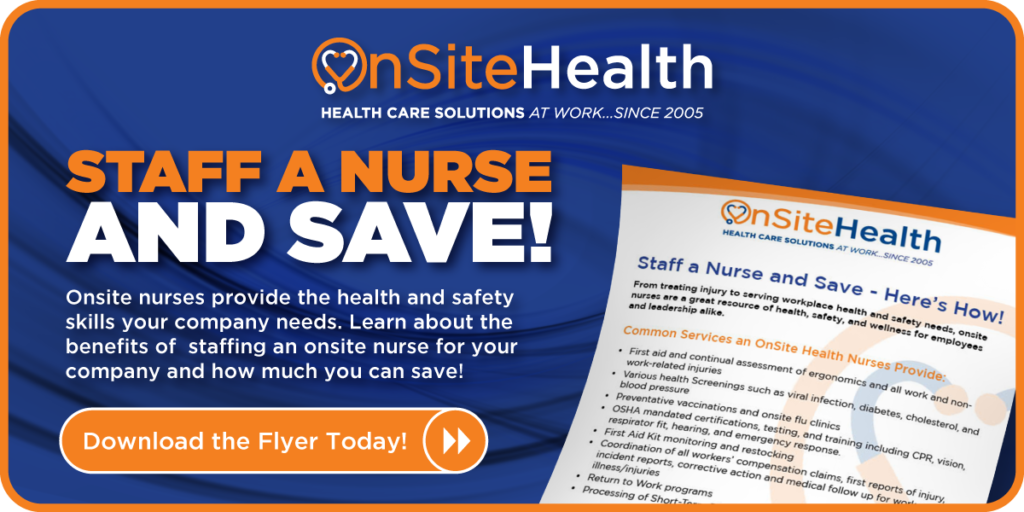Aspartame is an artificial sweetener which has been used for decades in a wide range of food and beverage products. It is significantly sweeter than sugar, making it a popular choice for those looking to cut back on their sugar intake or manage their weight. However, there has been ongoing debate and controversy about the safety of aspartame. In this blog, we will explore the current state of research on aspartame safety and aim to provide a balanced perspective on the topic.
Staff an OnSite Health Nurse and Save
>>Click Here for our ROI of On-site Nurses Flyer<<
What is Aspartame?
Aspartame is created by combining two amino acids: aspartic acid and phenylalanine. It is roughly 200 times sweeter than sugar, allowing for much smaller quantities to be used in food and beverages while still providing a sweet taste. As a result, it is used in a variety of products such as:
- Diet sodas and soft drinks
- Sugar-free chewing gum, candies, and mints
- Syrups, toppings, jams, and spreads with no added sugar
- Instant drink mixes for a sugar-free alternative
- Sugar-free dairy products, such as yogurt
Is Aspartame Safe?
At this time of writing, research is being conducted to investigate the safety of aspartame, but based on current evidence, aspartame is safe for human consumption when consumed in moderation. For instance, having a diet coke on occasion will likely not pose any harmful effects. However, consuming aspartame in large quantities over time can be potentially harmful. If someone has three diet sodas, two sugar-free gums, and a sugar-free treat every day, these exposures may accumulate over time and lead to negative effects on their health.
The FDA has set an acceptable daily intake (ADI) of 50 milligrams per kilogram (about two-thousandths of an ounce per 2 pounds) of body weight. This means that, for example, an adult weighing 70 kilograms (154 pounds) could consume up to 3500 milligrams (about 1-tenth ounce) of aspartame per day without any expected negative health effects.
However, it is important to be aware of any personal sensitivities or specific health conditions that may warrant caution or restriction in the consumption of aspartame. For people with phenylketonuria (PKU), a rare genetic disorder, aspartame should be avoided because it contains phenylalanine, which they cannot metabolize.
Additionally, phenylalanine can trigger allergic reactions in some people with symptoms including:
- Itching
- Swelling of the face or hands
- Trouble breathing
- Tingling feeling in the mouth

Aspartame is considered safe for human consumption when consumed in moderation.
Addressing Potential Health Risks
The debate surrounding aspartame arises from studies that have suggested potential health risks associated with its consumption. Some concerns include:
Cancer: There have been claims that aspartame may increase the risk of cancer—especially blood-related cancers like leukemia and lymphoma. The IARC classifies aspartame as “possibly carcinogenic to humans.” However, more research is needed to draw definitive conclusions.
Neurological Effects: Another concern is the potential impact on neurological health. Some studies have linked aspartame to headaches, migraines, and other neurological symptoms. However, the overall body of research does not provide conclusive evidence.
Cardiovascular Health: There have been concerns regarding the effects of aspartame on cardiovascular health. Some studies have suggested a potential association between aspartame consumption and an increased risk of heart disease, high blood pressure, and metabolic syndrome.
Weight Gain: Paradoxically, despite being low in calories, some studies have associated aspartame consumption with weight gain and obesity. However, the data is inconsistent, and other studies have found no evidence of a direct causal relationship between aspartame and weight gain. Factors such as overall diet, lifestyle, and individual metabolism are likely to play a more significant role in weight management.
It is important to note that individual responses to aspartame may vary. Some people may be more susceptible to the potential side effects, while others may experience no adverse effects.
OnSite Health: Your Partner in Employee Well-Being and Healthcare Services
Aspartame is generally considered safe for moderate consumption based on extensive studies and regulatory approval. While concerns exist, most evidence suggests it poses no significant health risk for the majority of people if consumed in moderation. However, it’s important for people with specific health conditions to exercise caution and consider alternatives. If you have any concerns about aspartame or other food additives, it’s always a good idea to consult with a healthcare professional. At OnSite Health, we provide on-site nurses who are licensed, trained, experienced, and educated in providing high-quality healthcare services. We can assist employees with addressing any health-related concerns related to additives like aspartame. If you want to learn more about what OnSite Health can do for your organization, check out our services.

